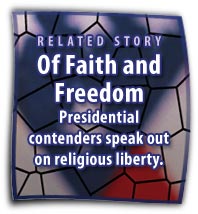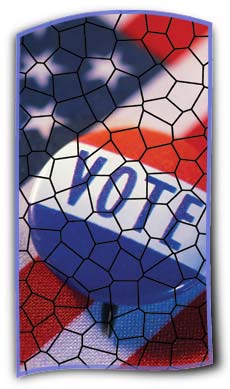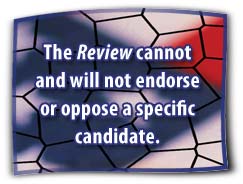
ICTURE THIS: A candidate for the office of President of the United States stands up
in a South Carolina megachurch one Sunday morning and declares: “We’re going to keep on praising together. I am confident that we can create a kingdom right here on earth.”
1
Or this: Another candidate advertises their faith-based outreach in a state’s churches by quoting Esther 4:14, which reads in part: “. . . who knows but that you have come to royal position for such a time as this?”2
And how about this one? A third contender says they believe the Bible is the Word of God, but “I don’t believe every single thing in the literal sense of Jonah being in the belly of the whale.”3
All three items took place in the fall of 2007 as candidates for the Democratic and Republican presidential nominations barnstormed the early primary and caucus states. Interestingly, however, it was two Democrats—Senators Barack Obama (Ill.) and Hillary Rodham Clinton (N.Y.)—who, separately, invoked the “kingdom” and quoted Esther’s uncle Mordecai, while it was a GOP contender, former New York City mayor Rudolph W. Giuliani, who expressed doubts about Jonah’s story.

Such is the seemingly topsy-turvy world of American presidential politics in 2008: the Democrats are making active efforts to invoke the language of faith, a tactic reserved in recent years for the GOP. At the same time, nearly 50 years after the first Roman Catholic was elected president, the question of whether or not a member of the Church of Jesus Christ of Latter-day Saints, whose members are also known
as Mormons, would suffer at the ballot box because of his faith is wide open.
Some Adventist Review readers will find the simple fact of an article addressing the role of religion in the current political season to be distressing, believing that even referring to “politics” is beneath the mission of this magazine. Founded in 1849 as The Present Truth, the magazine has carefully avoided involvement in partisan politics for more than 150 years, even as it has frequently called the attention of its readers to the great issues of society with which they must deal as citizens and voters. Slavery, temperance, poverty, and peacemaking have all been discussed at length in these pages, though the magazine has carefully avoided any inference that it is supporting a particular party or candidate as it seeks to educate and inform readers about the social implications of Christian and Adventist faith.
Such is still the case. The Adventist Review cannot and will not endorse or oppose a specific candidate or political organization in this year or any other, even as it goes about its important task of helping readers understand the important issues being discussed in the public square.
There’s no mistaking the rise in the level of what Phyllis Tickle once called “God-Talk in America” in this political season, and not just in the “stump speech” rhetoric. The rise in religiosity and religious language is one of the central highlights of the 2008 U.S. presidential campaign, an 18-month marathon now stretching from spring, 2007, to November 4, 2008. As this issue appears in print, important caucuses and primary elections in Iowa, New Hampshire, and South Carolina promise to change the political landscape. By early March, more than half of the states of the U.S. will have voted for 18 candidates seeking the highest office in the land. Seventh-day Adventists, among other “faith-based” voters, are wondering about the issues they ought to consider in exercising their rights as citizens.
Noted secular election observers are also paying close attention: Larry J. Sabato, university professor of politics at the University of Virginia, and a near-ubiquitous fixture on cable and network television political news reports, told Adventist Review that the 2008 race is evoking political-religious discussions of years gone by, with echoes of the 1960 controversy over the candidacy of then-Senator John F. Kennedy, a Roman Catholic.
“Religion is a vital part of American life for a substantial majority of citizens, and it’s inevitable that, from time to time, the two subjects will mix. We even recycle the same controversies,” Sabato said. “For years after J.F.K. was elected president in 1960, many observers thought the question of any religious bar to the Oval Office was answered. But the controversies in 2008 show that isn’t the case. Perhaps each new generation reconsiders the matter anew.”
Sabato added, “The Constitution bars any religious test for public office, but there is no way to prohibit individual Americans from taking religious affiliation into account when they enter the voting booth. As long as religion is important to citizens, and as long as there are denominational differences, this distinction will persist.”

This persistence seems to have taken on new life in 2008. Many of the weekly newsmagazine covers about the candidates have focused on the role religion plays in their lives. Political talk shows feature questions about whether one
candidate believes the faith of another contender is or isn’t Christian. Even atheists and secularists are complaining that there’s too much emphasis on faith in this election cycle.
Why all the “God-talk” now? In part, says Shaun Casey, an assistant professor of Christian ethics at Wesley Theological Seminary in Washington, D.C., it’s because the nation’s media were apparently blindsided by the influence of religious voters—largely deciding state initiatives on the definition of marriage—on the results of the 2004 campaign.
“After 2004, a lot of the national press corps came to the realization they covered religion poorly in that election,” Casey said in a telephone interview with the Adventist Review. “Then you match that with a perception on both sides of the aisle that you have to talk about religion and then it’s the ‘perfect storm,’” he added. “It’s going to be a silly season. . . . There’s going to be a lot of God-talk.”
But beyond the comparisons—sometimes inane—of the piety level of this or that politician, there are important issues to be decided in the 2008 election according to thought leaders in the Seventh-day Adventist community.
“I think the ‘big four’ are issues relating to war and security, immigration is an issue, health care and the economy is always mentioned,” says Gary Wood, an assistant professor of political science at Adventist-owned Andrews University in Berrien Springs, Michigan. “If we think back to the 2004 election, we shouldn’t be too surprised that social issues are a factor as well.”
Wood, whose doctoral dissertation on John Quincy Adams’ political thought and understanding of the U.S. Constitution was published as Heir to the Fathers: John Quincy Adams and the Spirit of Constitutional Government (Lexington Books, 2003), noted the current debate over the treatment of enemy combatants in the war on terror and its relevance for traditional Adventist concerns about civil liberties.
“Adventists should think about [this:] we’re a denomination that has championed civil liberties in the past and we should continue to do that, be vigilant guardians of civil liberties,” he says. “At the same time we need to be prudent enough to recognize there’s a delicate balance that needs to be forged between the demands of national security and liberty. In fact, our liberties depend on maintaining a reasonable degree of security.”
Marvin Moore, a veteran Seventh-day Adventist pastor and editor of Signs of the Times magazine in Nampa, Idaho, also said voters, including Adventists, will want to look at the issue of terrorism closely, because of a connection to the issue of keeping church and state separate, which is a historic Adventist tenet.
Moore said voters should ask candidates “how they would fight terrorism. This is related to our stand [on separationism] because [some] Muslims who favor church/state union are sponsoring terrorism. I don’t think any of us would want [Islamic] sharia law imposed on this country.”
He added, “A major issue we should be looking at is the individual’s understanding of church/state separation and religious freedom. I haven’t heard any of the candidates say anything yet that would cause me alarm.
“After nomination, it will be the time to ask them very serious questions about their stand on religious freedom and church/state separation,” he added, noting the discussion of religious liberty and politics in his 2007 book Could It Really Happen? (Pacific Press).
Lincoln Steed, editor of Liberty magazine, a century-old Adventist publication, also sees a link between the fight against terrorism and religious freedom.
“It should be more concerning to ask what these candidates think about basic human freedom issues and how to treat people in detention and so on,” Steed says. “These have great ramifications for religious freedom and for how this country will continue to relate to what is at root a stress point of religious conflict.”
According to one official of the church’s North American Division, tensions within the United States must also be considered when weighing political choices this year. José Vicente Rojas, director of the Office of Volunteer Ministries for the North American Division of Seventh-day Adventists, said that issues including the economy, the environment, and the war in Iraq are among those straining the national fabric, and thus of concern to Adventists as well.
“The nation has never been so divided since the American Civil War. All of these issues, including immigration, are issues that will be resolved, but in the meantime, tensions are unacceptably inhumane, impatient, and unchristian,” Rojas said. “We do not, as a nation, love our neighbor as ourselves at this moment.

“We therefore have the opportunity, as a nation, to take steps to come together as a people, and ‘they’ll know we are Christians by our love,’” he added.
But part of “showing the love,” to borrow a popular phrase, among religious voters is showing their faith-friendliness, says Liberty’s Steed.
“Now it is not a liberal versus conservative issue, but both party candidates will have to placate the Religious Right.” Steed says that some presidential contenders “have to sell themselves as a person of faith who is sensitive to the faith agenda, whether it is a moral issue, or whether they see this as an inherently religious country.” Other candidates understand that “a lot of this talk of ‘playing to the base’ is code for being acceptable to an aggressive religious agenda.”
However, Steed said, aggressive religiosity isn’t confined to one end of the political spectrum: “The Democrats have ‘got religion,’ they’re doing it a little more transparently at the moment, and they’re feeling their way. With the Republicans, it’s more ensconced.”
Moore, though eying religious conservatives as a likely source of threats to religious liberty, allowed that such challenges could come from the other side: “Anything is possible,
I suppose. I see the Religious Right as primarily composed of conservative Catholics and conservative Protestants. The Democratic Party hasn’t tended to cater to that group; the Republican Party has. . . . We’ll have to see how it works out.”
Whatever the outworkings, says James Standish, director of Legislative Affairs for the General Conference of Seventh-day Adventists, there are broader principles to consider.
“We must remember we are Christians before anything else,” Standish said. “This means viewing candidates and their policy positions through a Christian worldview, rather than using theology to justify our political preferences.”
Standish believes that addressing issues of providing a good environment for raising children, helping the disadvantaged work their way up from poverty, and peacemaking are key issues.
“We must support policies that foster peace even while acknowledging that the appeasement of tyrants may be the greatest long-term threat to peace.”
For Steed, it’s a time to remember core Adventist values and teachings: “As always, this is a time for Adventist Christians to combine their sense of civic responsibility and care for the community around them [with an understanding] that we are citizens of a higher kingdom and preparing a way for that kingdom. Not all things can be solved now nor can we prepare the kingdom of God on earth.”
He said the most important work of the election season may be accomplished on our knees.
“What is abundantly obvious is that with the post-9/11 terrorist threat, with economic uncertainty looming and our recent vulnerability to natural calamity and a certain loss of our identity in America—Christian nation or democratic republic—we need to pray for our nation as never before. We are at a defining time for our nation,” Steed said.
____________
1Peter Hamby, “Obama: GOP Doesn’t Own Faith Issue,” CNN.com, October 8, 2007, http://tinyurl.com/2hy8od; accessed December 13, 2007. 2See Dan Gilgoff, ed., “Following Obama, Clinton Stages ‘Faith Tour,’” Beliefnet.com, October 31, 2007, http://tinyurl.com/29m3er; accessed December 13, 2007. 3Giuliani, as quoted in “CNN/YouTube Republican Presidential Debate Transcript, Part II,” CNN.com, November 29, 2007, http://tinyurl.com/yv8h9b; accessed December 13, 2007.
______________________
Mark A. Kellner is news editor of Adventist Review and Adventist World.

 Such is the seemingly topsy-turvy world of American presidential politics in 2008: the Democrats are making active efforts to invoke the language of faith, a tactic reserved in recent years for the GOP. At the same time, nearly 50 years after the first Roman Catholic was elected president, the question of whether or not a member of the Church of Jesus Christ of Latter-day Saints, whose members are also known
as Mormons, would suffer at the ballot box because of his faith is wide open.
Such is the seemingly topsy-turvy world of American presidential politics in 2008: the Democrats are making active efforts to invoke the language of faith, a tactic reserved in recent years for the GOP. At the same time, nearly 50 years after the first Roman Catholic was elected president, the question of whether or not a member of the Church of Jesus Christ of Latter-day Saints, whose members are also known
as Mormons, would suffer at the ballot box because of his faith is wide open. This persistence seems to have taken on new life in 2008. Many of the weekly newsmagazine covers about the candidates have focused on the role religion plays in their lives. Political talk shows feature questions about whether one
candidate believes the faith of another contender is or isn’t Christian. Even atheists and secularists are complaining that there’s too much emphasis on faith in this election cycle.
This persistence seems to have taken on new life in 2008. Many of the weekly newsmagazine covers about the candidates have focused on the role religion plays in their lives. Political talk shows feature questions about whether one
candidate believes the faith of another contender is or isn’t Christian. Even atheists and secularists are complaining that there’s too much emphasis on faith in this election cycle. “We therefore have the opportunity, as a nation, to take steps to come together as a people, and ‘they’ll know we are Christians by our love,’” he added.
“We therefore have the opportunity, as a nation, to take steps to come together as a people, and ‘they’ll know we are Christians by our love,’” he added.